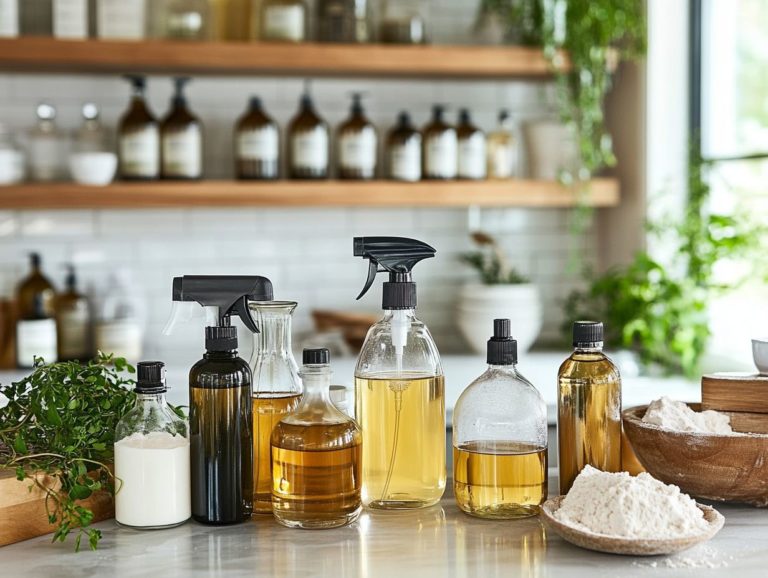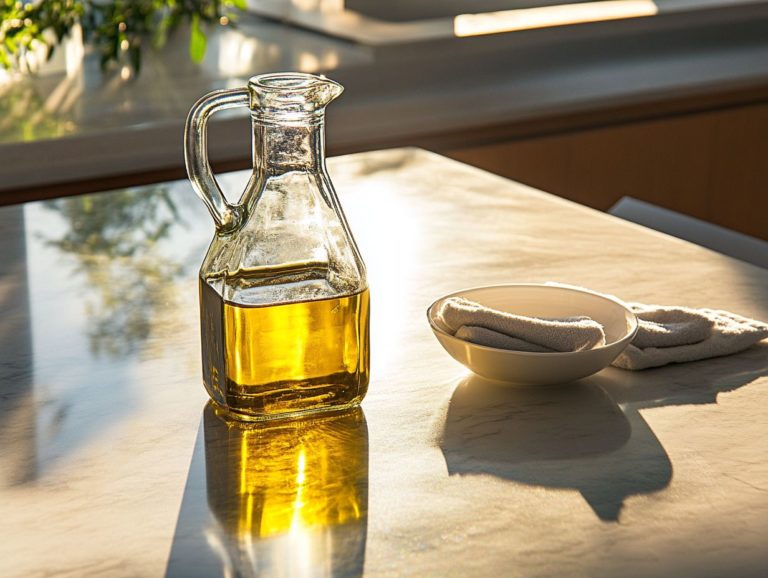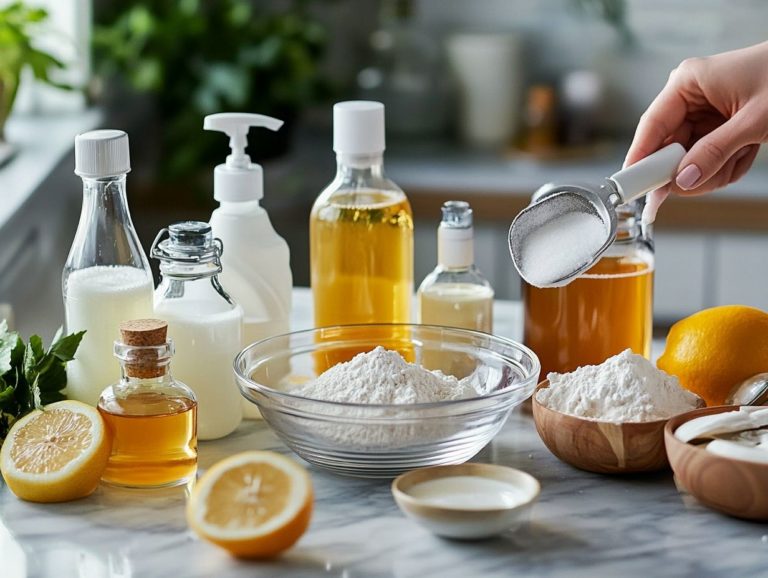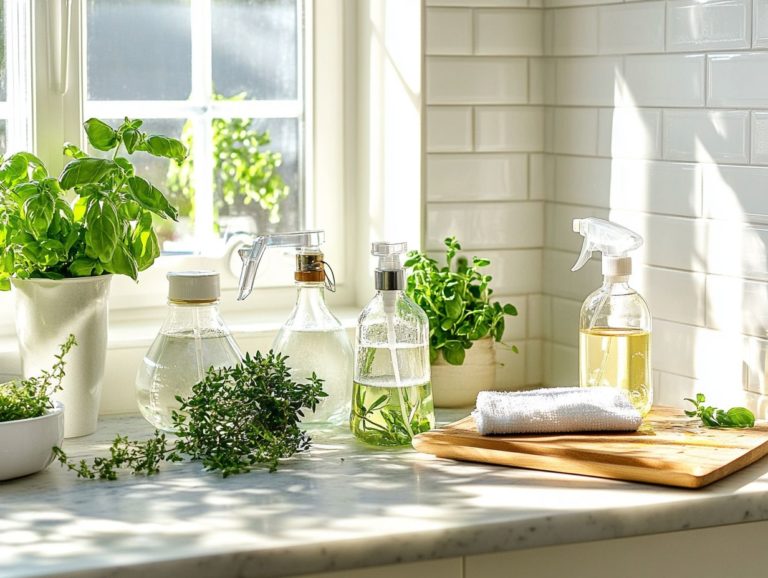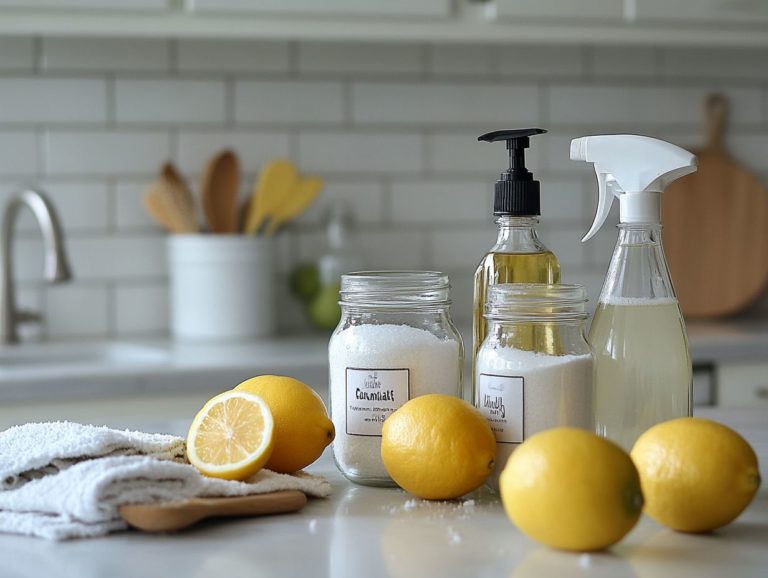How to Customize Your Own Cleaning Recipes?
Are you tired of harsh chemicals in commercial cleaning products? These substances may pose serious risks to the environment.
Imagine the benefits of crafting your own homemade cleaning recipes! By customizing your cleaners, you not only save money but also make eco-friendly choices and gain control over the ingredients that come into contact with your home.
From budget-friendly solutions to delightful fragrances, this guide will lead you through the essentials of creating an all-purpose cleaner, a natural disinfectant, and even DIY disinfectant wipes. It empowers you to take command of your cleaning routine.
Delve into the straightforward steps to personalize your cleaning experience, enhance your household cleaning techniques, and discover green cleaning tips!
Contents
- Key Takeaways:
- Why Should You Customize Your Own Cleaning Recipes?
- What Are The Benefits Of Making Your Own Cleaning Recipes?
- What Are The Basic Ingredients Needed For Making Cleaning Recipes?
- How To Customize Your Own All-Purpose Cleaner?
- How To Make Your Own Natural Disinfectant?
- Frequently Asked Questions
- What are the benefits of customizing my own cleaning recipes?
- How do I know which ingredients to use in my customized cleaning recipe?
- Can I use regular household products to customize my cleaning recipes?
- How do I ensure that my customized cleaning recipe is safe and effective?
- Can I add scents to my customized cleaning recipes like bathroom cleaner or kitchen cleaner?
- How do I store my customized cleaning recipes and other eco-friendly cleaning solutions?
Key Takeaways:
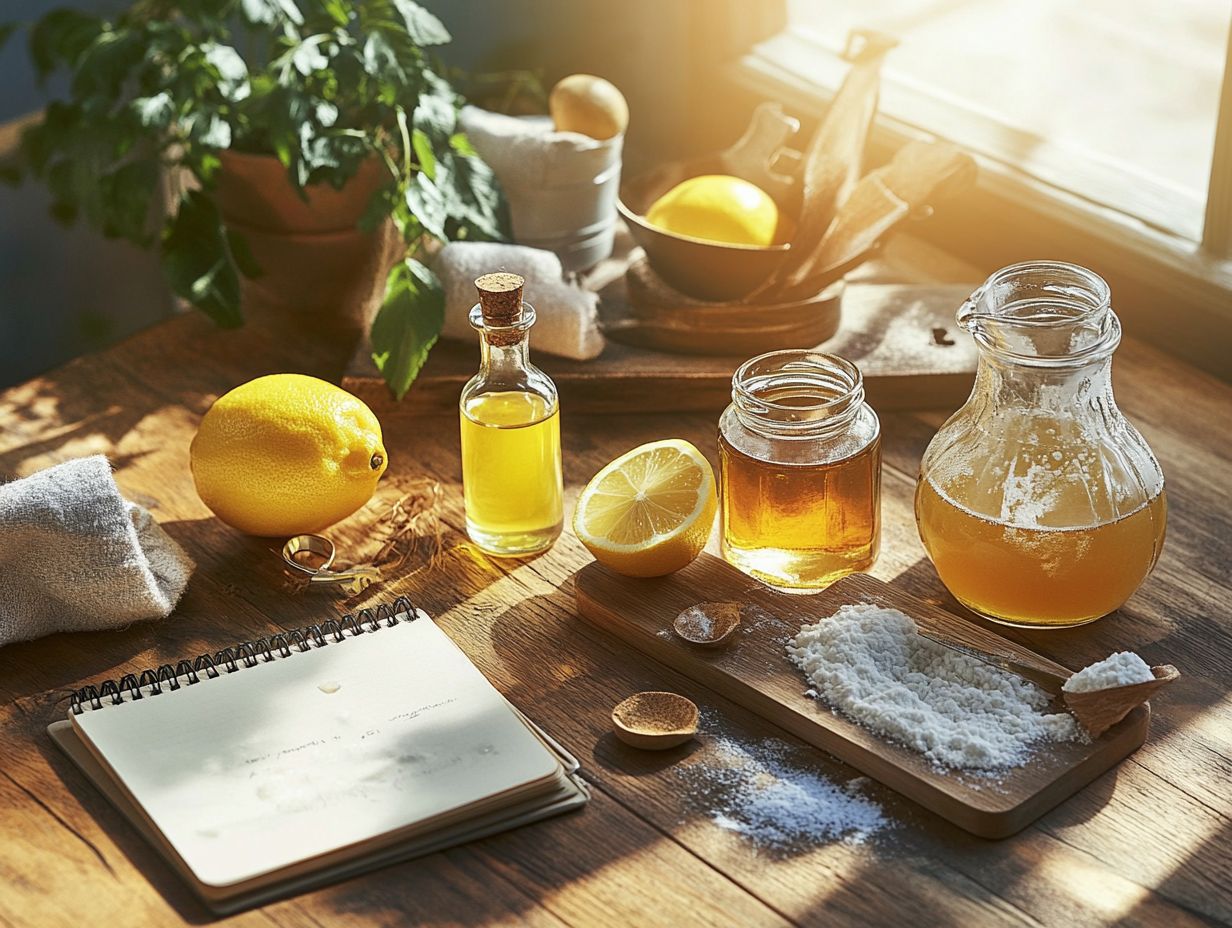
- Making your own cleaning recipes can save you money and reduce your impact on the environment.
- With control over ingredients, you can personalize your cleaning products with different scents and avoid harsh chemicals.
- Basic ingredients like baking soda, vinegar, lemon juice, castile soap, and hydrogen peroxide are all you need to create effective cleaning solutions.
Why Should You Customize Your Own Cleaning Recipes?
Customizing your own cleaning recipes enables you to craft homemade cleaning products that are not only effective but also perfectly suited to your unique cleaning needs and preferences. By embracing this approach, you can rest assured that you re using eco-friendly solutions that prioritize the safety of your family and pets, while remaining conscious of the risks to the environment associated with commercial cleaning supplies.
Choosing all-natural cleaners provides germ-killing properties without harsh chemicals typically found in store-bought alternatives. Personalizing your cleaning routine not only makes it more satisfying but also turns it into an efficient experience you ll love.
What Are The Benefits Of Making Your Own Cleaning Recipes?
Creating your own cleaning recipes offers a wealth of benefits, from saving money to enjoying full control over the ingredients in your homemade products.
By crafting your own eco-friendly cleaning solutions, you not only cut costs on commercially available items but also reduce your environmental footprint, making your home a model of green cleaning.
Plus, the freedom to customize scents with essential oils like lavender, lemon oil, or peppermint oil elevates your cleaning routine, making it more enjoyable and personalized to your tastes.
1. Cost-Effective
Creating your own cleaning products is a savvy move and a smart financial strategy. By utilizing common household items like vinegar, baking soda, and essential oils, you can craft effective alternatives that won t break the bank.
These homemade solutions often outshine their commercial counterparts in terms of performance while helping you to slash your ongoing expenses. Take vinegar, for example: a gallon costs around two dollars, and with just a cup, you can tackle everything from countertops to windows and even deodorize the fridge. It s astonishingly more economical than stocking up on multiple specialized cleaners. You can even use it as a natural rinse aid in your dishwasher to avoid residue.
Then there s baking soda, typically available for under a dollar per pound it s an exceptional scrubber and deodorizer that elevates your cleaning game without inflating your budget. Baking soda can also be combined with Kool-Aid for a fun, fruity-scented scrub.
When you weigh the costs of these DIY options against those of commercial brands, the appeal of homemade cleaners becomes strikingly clear, creating a delightful win-win for your wallet and the environment alike.
2. Environmentally Friendly
Homemade cleaning recipes embody a commitment to environmentally friendly practices. They use all-natural cleaners that significantly lessen the harmful effects of harsh chemicals on our planet. Embrace these natural methods to keep your home safe from environmental dangers.
Choosing DIY solutions reduces plastic waste from traditional cleaning products. Most store-bought cleaners come in non-recyclable containers, contributing to the growing pollution crisis. Homemade air fresheners can also help cut down on single-use plastic.
These homemade alternatives often rely on ingredients you probably already have at home, like vinegar, baking soda, and essential oils. These biodegradable options are free from the toxic substances typically found in commercial cleaners.
Using eco-friendly alternatives creates a healthier living environment and encourages a sustainable mindset. This promotes greener lifestyles and conscious choices that benefit both homes and the Earth.
3. Control Over Ingredients
Creating your own cleaning supplies gives you remarkable control over the ingredients you choose. You can select non-toxic options like vinegar, baking soda, and essential oils without harmful additives. Consider adding borax (a natural mineral) or washing soda (sodium carbonate) for extra cleaning power.
This gives you the ability to prioritize your health and safety. Many commercial cleaners contain harsh chemicals that can trigger allergies or respiratory issues, especially for vulnerable groups like children and pets. You can also tailor homemade supplies to be safe for those with specific allergies.
When you choose homemade alternatives, you ensure every ingredient is safe and effective. For example, vinegar disinfects and acts as a natural deodorizer, while baking soda provides a gentle abrasive action for scrubbing surfaces.
Essential oils like tea tree, lavender, or orange can make your cleaning routine more enjoyable. They add delightful scents and boost antibacterial properties, enhancing the effectiveness of your natural cleaning solutions.
4. Personalized Scents
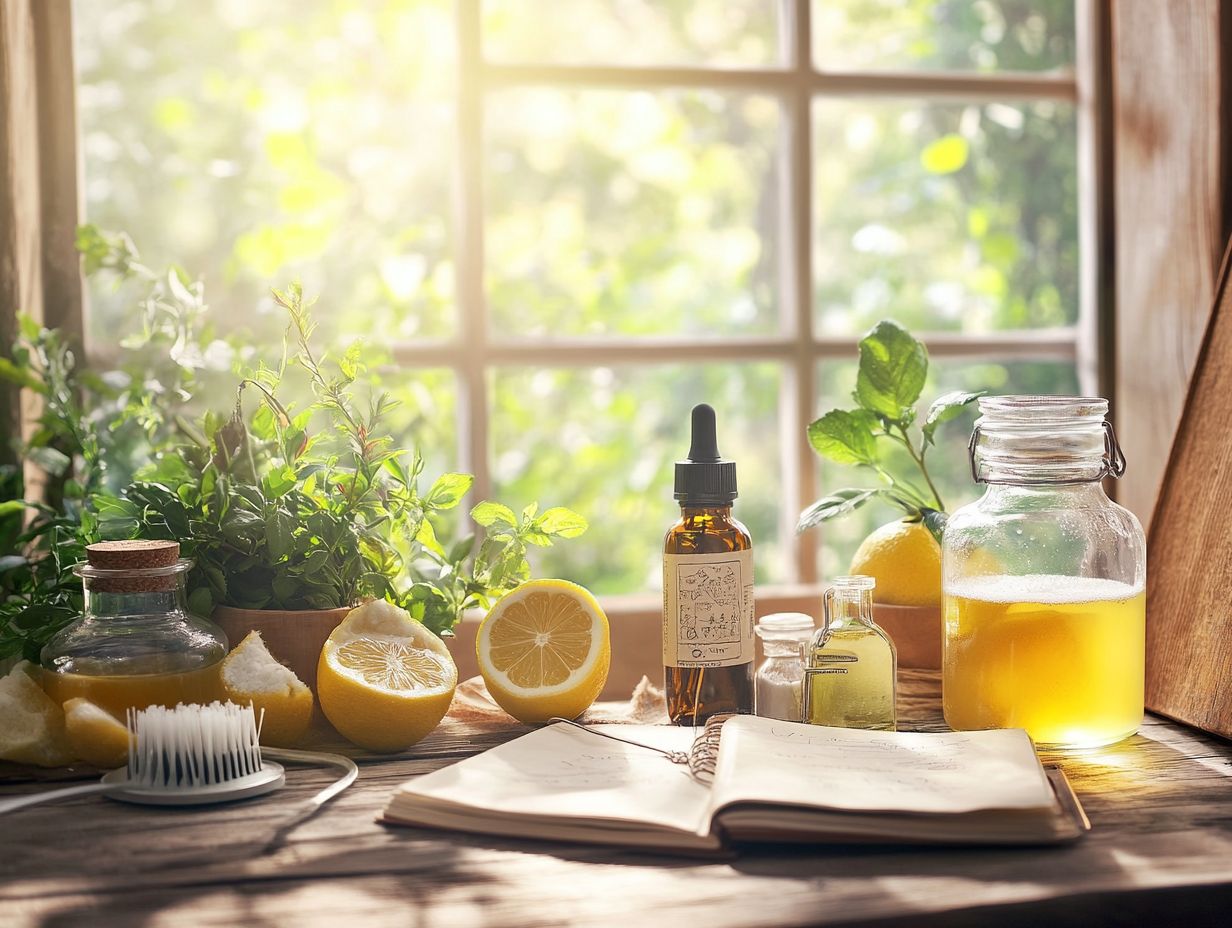
Imagine transforming your cleaning routine into an aromatic adventure! One of the most delightful aspects of crafting your own cleaning recipes is the chance to create personalized scents. Choose from a variety of essential oils like lavender, lemon, or peppermint.
These natural fragrances enhance your cleaning experience and offer therapeutic benefits. Picture the uplifting aroma of citrus as you wipe surfaces or the calming scent of lavender soothing your senses while you scrub.
Choosing the right essential oils can help mask unpleasant odors while purifying the air. With options from invigorating eucalyptus to sweet orange, the possibilities are endless. You can approach cleanliness in a way that reflects your unique preferences. Use lavender oil for relaxation, lemon oil for freshness, or peppermint oil for energizing scents.
What Are The Basic Ingredients Needed For Making Cleaning Recipes?
As you start creating homemade cleaning products, several essential ingredients are critical. Consider incorporating versatile staples like:
- baking soda
- white vinegar
- lemon juice
- castile soap
Each of these ingredients boasts remarkable cleaning properties. They are key players in your natural cleaning arsenal. Dive into these ingredients today and start crafting your own eco-friendly cleaners!
1. Baking Soda
Baking soda is a remarkably versatile ingredient that serves as a natural deodorizer and scrubbing agent. It s a must-have in your homemade cleaning products. Its mild abrasiveness allows you to scrub effectively without scratching surfaces, making it perfect for cleaning countertops, sinks, and stovetops. You can create a quick cleaning spray using baking soda and water for daily surface cleaning.
When faced with tough stains, whip up a paste of baking soda and water. Apply it to the stain, let it sit for a few minutes, then wipe it away for impressive results. When you mix baking soda with vinegar, it creates a powerful foaming action that s ideal for unclogging drains.
To freshen up your carpets, sprinkle baking soda generously over the area. Let it sit for several hours, then vacuum it up. You ll enjoy a fresher, cleaner smell in your space!
2. White Vinegar
White vinegar is a powerful natural disinfectant that deserves a spot in your cleaning supplies. It s more than just a kitchen staple; it s a versatile hero for a variety of household tasks. You can even use white vinegar as a fabric softener in your laundry or as a rinse aid in your dishwasher.
Combine white vinegar with baking soda to create a fizzing paste that lifts soap scum from bathroom surfaces. A mixture of equal parts white vinegar and water makes an exceptional glass cleaner, leaving your windows streak-free and shimmering!
Add a cup of white vinegar during the rinse cycle to freshen up your laundry. It breaks down residues and neutralizes odors, giving your clothes a fresh, clean scent.
Whether you re sprucing up the kitchen, bathroom, or laundry room, this eco-friendly solution helps you achieve a spotless home without harsh chemicals. You can even make specific products like homemade kitchen cleaner or laundry detergent to reduce your environmental footprint.
3. Lemon Juice
Lemon juice is not just refreshing; it has natural cleaning properties that can brighten surfaces, cut through grease, and act as an effective stain remover. Use it with vinegar or baking soda for even better results.
This citrus powerhouse contains citric acid, a natural acid found in lemons that helps clean. It efficiently breaks down grime and eliminates odors, making it a fantastic addition to various cleaning solutions. Blend lemon juice with baking soda for stubborn stains or put it in a spray bottle diluted with water to refresh and sanitize surfaces.
Incorporating lemon juice into your cleaning routine maintains a pristine environment and leaves behind a delightful, natural fragrance. Your home will smell as fresh and vibrant as the lemon itself! This simple technique can replace many commercial cleaning supplies.
4. Castile Soap and Borax
Castile soap is a biodegradable option that serves as an exceptional base for a wide range of all-natural cleaners. It s a staple in your homemade cleaning arsenal. Mixing it with borax, a naturally occurring mineral used in cleaning, enhances its power against stubborn grime.
Crafted from plant oils like olive, coconut, and hemp, this versatile soap meets various cleaning needs while promoting environmental sustainability. Its gentle properties make it safe for skin and surfaces, allowing for countless applications like kitchen and bathroom cleaners.
Mix a cup of Castile soap with water, vinegar, and a few drops of essential oils to create a powerful multi-surface cleaner. This solution tackles dirt without harmful chemicals! Dilute it with water for a gentle yet effective dishwashing liquid that cuts through grease and keeps your kitchen sparkling clean.
Laundry lovers can benefit too just add a few tablespoons to your wash for a fresh, natural way to cleanse your clothes.
How To Customize Your Own All-Purpose Cleaner?
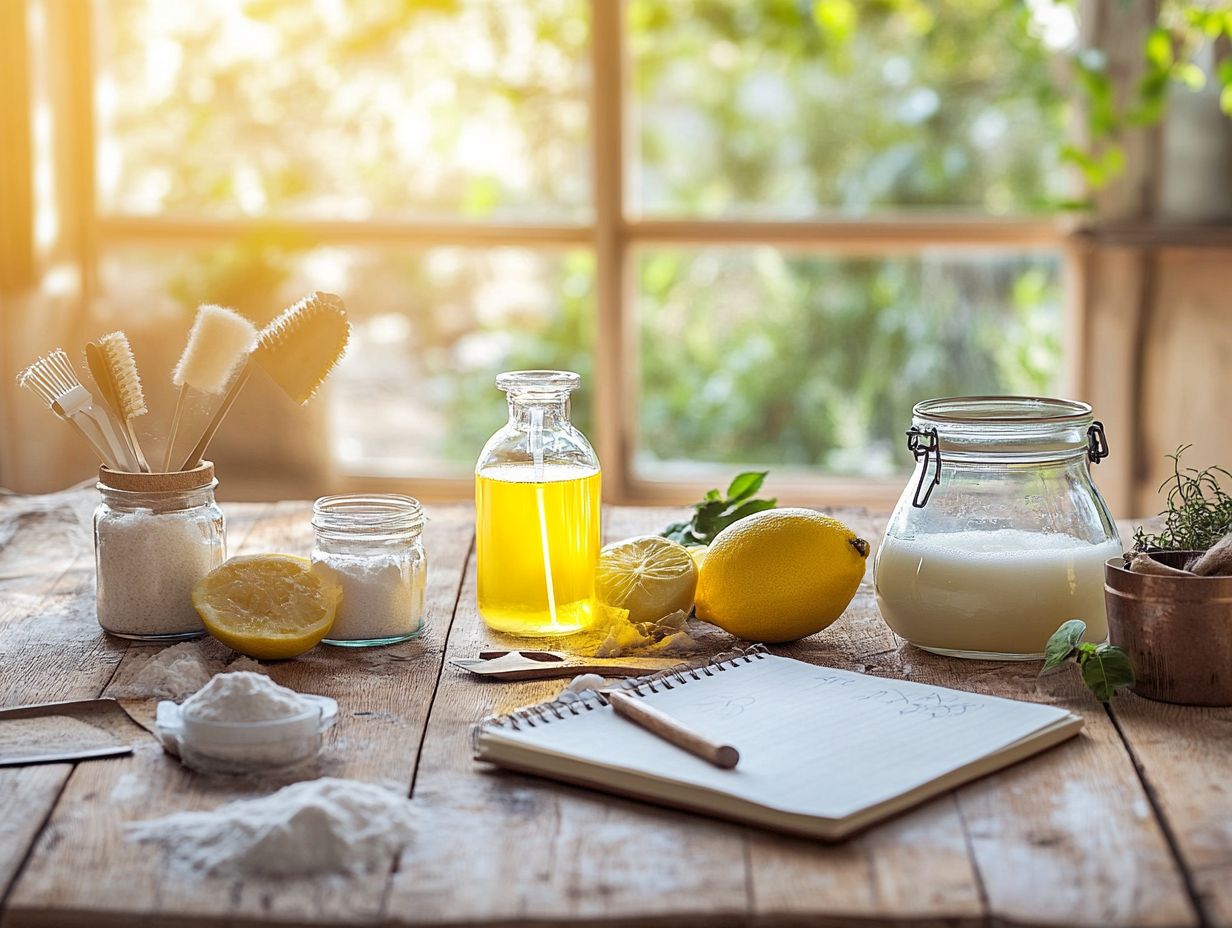
Customizing your own all-purpose cleaner is not just simple; it’s a rewarding endeavor that enables you to craft a cleaning spray perfectly tailored to your unique needs and preferences.
By carefully selecting the right ingredients and scents, you can create a solution that not only cleans effectively but also delights your senses. Consider adding essential oils like lavender, tea tree, or peppermint for extra germ-killing properties and a refreshing aroma.
1. Choose Your Base
The first step in crafting your all-purpose cleaner is selecting the right base either white vinegar or a gentle vegetable-based soap tailored to the specific cleaning task you have in mind.
Each of these ingredients boasts unique cleaning properties. White vinegar is celebrated for its remarkable ability to cut through grease, dissolve mineral deposits, and refresh surfaces, making it an exceptional choice for tackling kitchen and bathroom messes.
Castile soap provides a gentle yet effective solution, perfect for those who prefer a biodegradable option, especially in households sensitive to harsh chemicals. For additional cleaning power, incorporate hydrogen peroxide or washing soda into your homemade recipes.
By grasping the distinct benefits and limitations of these bases, you can confidently choose the most effective ingredient for your particular cleaning needs, ensuring your home remains both spotless and safe.
2. Add Essential Oils
Incorporating essential oils into your all-purpose cleaner does more than just add delightful aromas; it elevates the cleaning experience by enhancing its effectiveness. Oils like lavender and tea tree bring natural antibacterial properties to the mix, making your cleaning routine not only more fragrant but also more efficient.
These powerful oils infuse your space with inviting scents while offering unique qualities that tackle dirt and grease. Take lemon oil, for example it’s celebrated for its ability to slice through grime while leaving a refreshing, citrusy scent in its wake.
Eucalyptus oil is another standout, boasting antiseptic properties that effectively combat mildew and mold. Similarly, the addition of peppermint oil can invigorate your senses while also providing natural cleaning power.
By using essential oils, you transform the mundane task of cleaning into a sensory delight while fostering a healthier environment. This choice supports a reduction in chemical residues and the synthetic fragrances often found in typical cleaning products, allowing you to breathe easier as you tidy up.
3. Experiment With Different Scents
One of the true joys of crafting your own cleaning products lies in the freedom to experiment with various scents. You can tailor your homemade air freshener or cleaner to suit your unique preferences.
With a delightful array of essential oils at your fingertips think vibrant citrus oils like lemon and orange, alongside calming florals such as lavender and geranium the possibilities for combinations are virtually endless.
As you blend these oils, keep in mind the different layers of scent. This approach can help you achieve a harmonious aroma that is both pleasing and effective. For example, combining tea tree oil, renowned for its antibacterial properties, with eucalyptus can yield a refreshing cleaner that not only delights the senses but also protects your home from harmful germs.
Adding a few drops of lavender or orange essential oils can create a calming or invigorating effect, depending on your preference. You might also consider enhancing your laundry detergent with a few drops of peppermint oil, infusing your clothes with an invigorating scent that leaves them smelling irresistibly fresh.
Incorporate a natural rinse aid to keep your fabrics soft and reduce static. Dive into your cleaning adventure and discover your favorite blend today!
How To Make Your Own Natural Disinfectant?
Ready to revolutionize your cleaning? Make your own natural disinfectant today! Creating your own natural disinfectant ensures that your cleaning routine is both efficient and devoid of harsh chemicals.
By utilizing straightforward ingredients such as vinegar, hydrogen peroxide, and essential oils, you harness powerful germ-killing properties while maintaining a healthier environment. This practice not only supports green cleaning but also minimizes exposure to potential environmental dangers associated with conventional products.
1. Use Vinegar And Hydrogen Peroxide
Combining vinegar and hydrogen peroxide creates a powerful natural disinfectant. This method is a game-changer for eco-friendly cleaning! It leverages their germ-fighting properties for effective cleaning and offers a safe alternative to commercial disinfectant wipes.
When used correctly, this method allows you to effortlessly tackle a range of household surfaces. This includes kitchen counters and bathroom fixtures. However, safety must always take precedence. Never mix these two substances in the same container, as doing so can produce harmful vapors. Instead, apply them sequentially: start with vinegar on the surface and let it sit for a moment. Follow up with hydrogen peroxide.
This approach enhances their disinfecting capabilities and reduces the risks associated with chemical reactions. This ensures you have a safer and more effective cleaning experience.
2. Add Essential Oils For Extra Cleaning Power
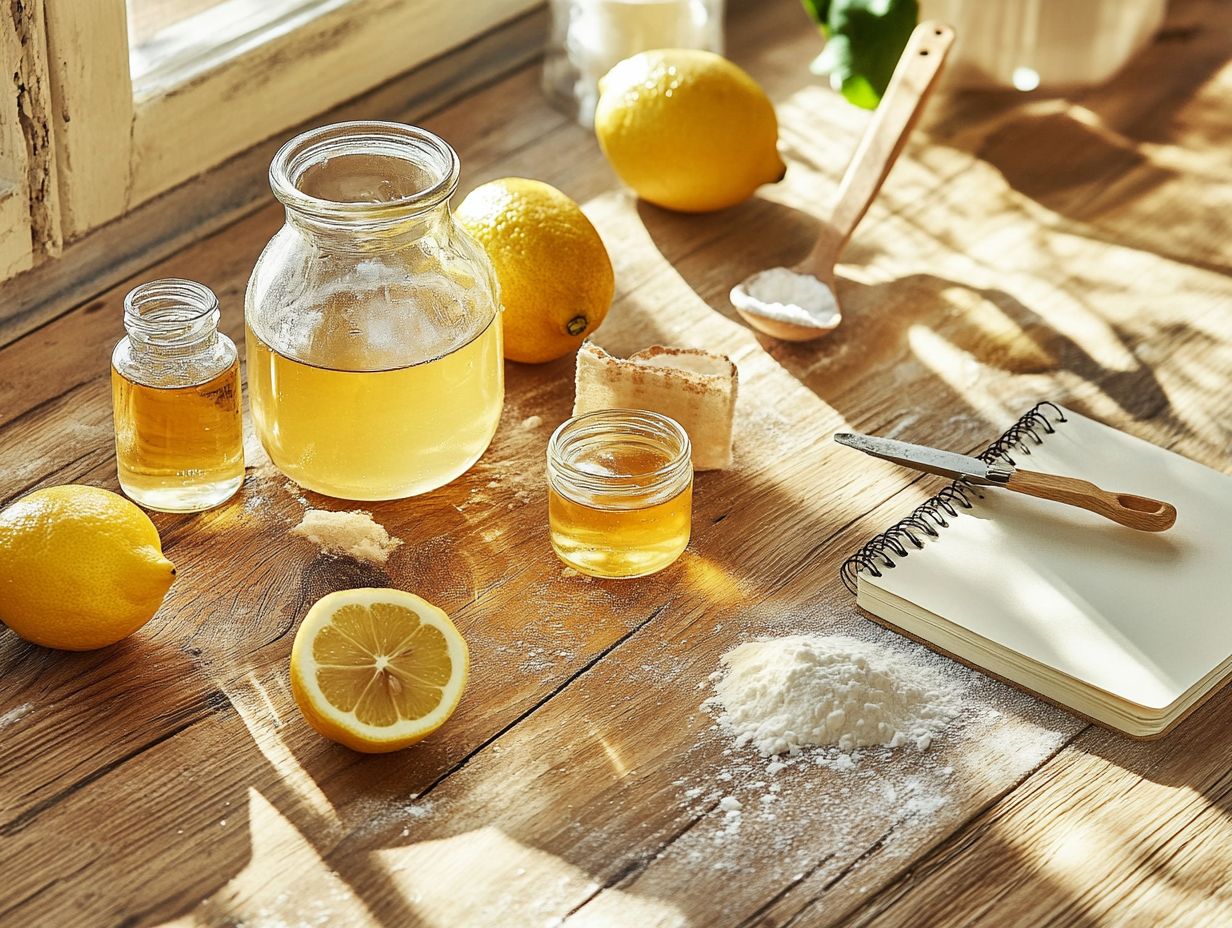
To elevate the cleaning power of your natural disinfectant, consider incorporating essential oils like tea tree oil or lavender oil. These oils are celebrated for their antibacterial and calming properties. By adding these oils, you can significantly reduce reliance on synthetic chemicals, promoting a healthier living environment.
These oils fill your space with delightful scents. They also enhance the ability of your cleaning solution to fight germs. Take eucalyptus oil, for example; it s renowned for its antiseptic qualities (substances that prevent infection), making it an exceptional choice for tackling stubborn grime while promoting respiratory health.
Lemon oil brings natural astringent properties to the table. It effortlessly lifts dirt and grease while leaving surfaces gleaming. By blending these beneficial oils into your cleaning routine, you can cultivate a more effective and aromatic cleaning experience that sanitizes your space and elevates its overall ambiance.
3. Try Different Combinations
Experimenting with various combinations of natural ingredients can unlock the potential for crafting unique and effective homemade disinfectants. This custom approach perfectly suits your cleaning needs.
Exploring options like vinegar, tea tree oil, and hydrogen peroxide can create a solution that disinfects while leaving your surfaces smelling wonderfully fresh. Start with small batches to assess their effectiveness. Fine-tune the ratios of each ingredient according to your preferences and the level of cleanliness you desire.
Incorporating essential oils introduces delightful fragrances and enhances antibacterial properties. Feel free to mix and match these components, always considering the nature of the surfaces you are cleaning. This hands-on approach elevates your cleaning routine and enables you to take control of your health and the environment in your home.
Frequently Asked Questions
For more eco-friendly cleaning ideas and natural cleaning techniques, watch informative videos on platforms like YouTube. These videos showcase various homemade recipes and their applications, encouraging you to try making your own!
What are the benefits of customizing my own cleaning recipes?
Customizing your own cleaning recipes allows you to control the ingredients and avoid harsh chemicals. This makes it safer for you and your family. It also lets you tailor the cleaning solution to specific surfaces or stains, like creating specialized kitchen cleaners or bathroom cleaners.
How do I know which ingredients to use in my customized cleaning recipe?
Look up how different natural ingredients work. This will help you choose the best ones for your cleaning needs. You can also experiment to find the best combination for your needs, ensuring maximum effectiveness and a pleasant sensory experience.
Can I use regular household products to customize my cleaning recipes?
Yes, many common household items can create effective and natural cleaning solutions. For example, lemon juice, salt, and olive oil work well. This approach saves money and reduces harsh chemicals in your home.
Consider using Kool-Aid as a toilet cleaner or borax as a versatile all-purpose cleaner.
How do I ensure that my customized cleaning recipe is safe and effective?
Always conduct a patch test on a small area before applying your homemade recipe widely. This helps prevent potential damage or discoloration.
Do your research and rely on reputable sources for creating all-natural cleaners. Baking soda, white vinegar, and hydrogen peroxide are effective ingredients.
Don’t forget to stock up on essential supplies like castile soap and washing soda.
Can I add scents to my customized cleaning recipes like bathroom cleaner or kitchen cleaner?
Yes, you can add essential oils like lavender, lemon, and tea tree oil to your cleaning sprays or homemade air fresheners. Use only a small amount and avoid oils that may irritate sensitive skin.
Peppermint oil or orange oil can also boost the germ-killing properties of your disinfectant wipes.
How do I store my customized cleaning recipes and other eco-friendly cleaning solutions?
Store your cleaning recipes, such as laundry detergent or fabric softener, in a cool, dark place away from direct sunlight. Label the containers with ingredients and instructions for use.
If you use essential oils, opt for dark glass bottles to maintain their strength. Proper storage ensures effectiveness and longevity of your eco-friendly solutions.

